The 35 Greatest Speeches in History
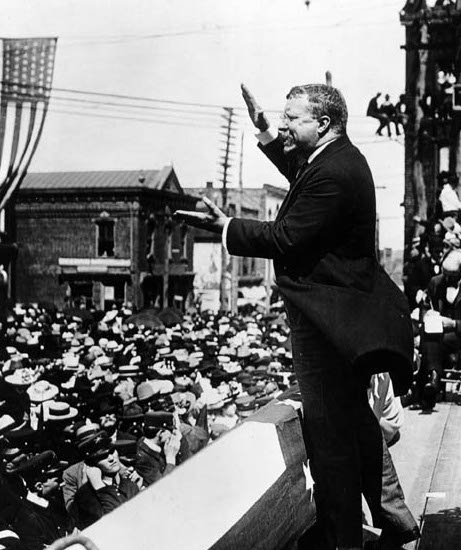 If a man wishes to become a great orator, he must first become a student of the great orators who have come before him. He must immerse himself in their texts, listening for the turns of phrases and textual symmetries, the pauses and crescendos, the metaphors and melodies that have enabled the greatest speeches to stand the test of time.
If a man wishes to become a great orator, he must first become a student of the great orators who have come before him. He must immerse himself in their texts, listening for the turns of phrases and textual symmetries, the pauses and crescendos, the metaphors and melodies that have enabled the greatest speeches to stand the test of time.
There was not currently a resource on the web to my liking that offered the man who wished to study the greatest orations of all time-from ancient to modern-not only a list of the speeches but a link to the text and a paragraph outlining the context in which the speech was given. So we decided to create one ourselves. The Art of Manliness thus proudly presents the “35 Greatest Speeches in World History,” the finest library of speeches available on the web.
These speeches lifted hearts in dark times, gave hope in despair, refined the characters of men, inspired brave feats, gave courage to the weary, honored the dead, and changed the course of history. It is my desire that this library will become a lasting resource not only to those who wish to become great orators, but to all men who wisely seek out the great mentors of history as guides on the path to virtuous manhood.
I know that readers of blogs are often more likely to skim than to read in-depth. But I challenge you, gentlemen, to attempt a program of study in which you read the entirety of one of these great speeches each and every day. I found the process of compiling and reading these speeches to be enormously inspiring and edifying, and I feel confident that you will find them equally so.
How did we compile this list?
Great oratory has three components: style, substance, and impact.
Style: A great speech must be masterfully constructed. The best orators are masters of both the written and spoken word, and use words to create texts that are beautiful to both hear and read.
Substance: A speech may be flowery and charismatically presented, and yet lack any true substance at all. Great oratory must center on a worthy theme; it must appeal to and inspire the audience’s finest values and ideals.
Impact: Great oratory always seeks to persuade the audience of some fact or idea. The very best speeches change hearts and minds and seem as revelatory several decades or centuries removed as when they were first given.
And now for the speeches.
Theodore Roosevelt, “Duties of American Citizenship”
January 26, 1883; Buffalo, New York
Given while serving as a New York assemblyman, TR’s address on the “Duties of American Citizenship” delved into both the theoretical reasons why every man should be involved in politics and the practical means of serving in that capacity. Roosevelt chided those who excused themselves from politics because they were too busy; it was every man’s duty to devote some time to maintaining good government.
Worthy Excerpt:
Of course, in one sense, the first essential for a man’s being a good citizen is his possession of the home virtues of which we think when we call a man by the emphatic adjective of manly. No man can be a good citizen who is not a good husband and a good father, who is not honest in his dealings with other men and women, faithful to his friends and fearless in the presence of his foes, who has not got a sound heart, a sound mind, and a sound body; exactly as no amount of attention to civil duties will save a nation if the domestic life is undermined, or there is lack of the rude military virtues which alone can assure a country’s position in the world. In a free republic the ideal citizen must be one willing and able to take arms for the defense of the flag, exactly as the ideal citizen must be the father of many healthy children. A race must be strong and vigorous; it must be a race of good fighters and good breeders, else its wisdom will come to naught and its virtue be ineffective; and no sweetness and delicacy, no love for and appreciation of beauty in art or literature, no capacity for building up material prosperity can possibly atone for the lack of the great virile virtues.
But this is aside from my subject, for what I wish to talk of is the attitude of the American citizen in civic life. It ought to be axiomatic in this country that every man must devote a reasonable share of his time to doing his duty in the Political life of the community. No man has a right to shirk his political duties under whatever plea of pleasure or business; and while such shirking may be pardoned in those of small cleans it is entirely unpardonable in those among whom it is most common–in the people whose circumstances give them freedom in the struggle for life. In so far as the community grows to think rightly, it will likewise grow to regard the young man of means who shirks his duty to the State in time of peace as being only one degree worse than the man who thus shirks it in time of war. A great many of our men in business, or of our young men who are bent on enjoying life (as they have a perfect right to do if only they do not sacrifice other things to enjoyment), rather plume themselves upon being good citizens if they even vote; yet voting is the very least of their duties, Nothing worth gaining is ever gained without effort. You can no more have freedom without striving and suffering for it than you can win success as a banker or a lawyer without labor and effort, without self-denial in youth and the display of a ready and alert intelligence in middle age. The people who say that they have not time to attend to politics are simply saying that they are unfit to live in a free community.
Read full text of speech here.
Winston Churchill, “We Shall Fight on the Beaches”
June 4, 1940; House of Commons, London
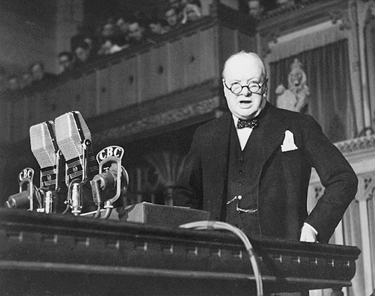
Winston Churchill, one of the greatest orators of the 20th century, was interestingly enough, like Demosthenes and other great orators before him, born with a speech impediment which he worked on until it no longer hindered him. One would never guess this from hearing Churchill’s strong and reassuring voice, a voice that would buoy up Britain during some of her darkest hours.
During the Battle of France, Allied Forces became cut off from troops south of the German penetration and perilously trapped at the Dunkirk bridgehead. On May 26, a wholesale evacuation of these troops, dubbed “Operation Dynamo,” began. The evacuation was an amazing effort-the RAF kept the Luftwaffe at bay while thousands of ships, from military destroyers to small fishing boats, were used to ferry 338,000 French and British troops to safety, far more than anyone had thought possible. On June 4, Churchill spoke before the House of Commons, giving a report which celebrated the “miraculous deliverance” at Dunkirk, while also seeking to temper a too rosy of view of what was on the whole a “colossal military disaster.”
Worthy Excerpt
I have, myself, full confidence that if all do their duty, if nothing is neglected, and if the best arrangements are made, as they are being made, we shall prove ourselves once again able to defend our Island home, to ride out the storm of war, and to outlive the menace of tyranny, if necessary for years, if necessary alone. At any rate, that is what we are going to try to do. That is the resolve of His Majesty’s Government-every man of them. That is the will of Parliament and the nation. The British Empire and the French Republic, linked together in their cause and in their need, will defend to the death their native soil, aiding each other like good comrades to the utmost of their strength. Even though large tracts of Europe and many old and famous States have fallen or may fall into the grip of the Gestapo and all the odious apparatus of Nazi rule, we shall not flag or fail. We shall go on to the end, we shall fight in France, we shall fight on the seas and oceans, we shall fight with growing confidence and growing strength in the air, we shall defend our Island, whatever the cost may be, we shall fight on the beaches, we shall fight on the landing grounds, we shall fight in the fields and in the streets, we shall fight in the hills; we shall never surrender, and even if, which I do not for a moment believe, this Island or a large part of it were subjugated and starving, then our Empire beyond the seas, armed and guarded by the British Fleet, would carry on the struggle, until, in God’s good time, the New World, with all its power and might, steps forth to the rescue and the liberation of the old.
Read full text of speech here.
Lou Gehrig, “Farewell to Baseball Address”
July 4, 1939; Yankee Stadium
It seemed as if the luminous career of Lou Gehrig would go on forever. The Yankee’s first baseman and prodigious slugger was nicknamed the Iron Horse for his durability and commitment to the game. Sadly, his record for suiting up for 2,130 consecutive games came to an end when at age 36, Gehrig was stricken with the crippling disease that now bears his name. On July 4, 1939, the Yankees held a ceremony to honor their teammate and friend. They retired Gehrig’s number, spoke of his greatness, and presented him with various gifts, plaques, and trophies. When Gehrig finally addressed the crowd, he did not use the opportunity to wallow in pity. Instead, he spoke of the things he was grateful for and what a lucky guy he was.
The Speech
Fans, for the past two weeks you have been reading about a bad break I got. Yet today I consider myself the luckiest man on the face of the earth. I have been in ballparks for seventeen years and have never received anything but kindness and encouragement from you fans.
Look at these grand men. Which of you wouldn’t consider it the highlight of his career to associate with them for even one day?
Sure, I’m lucky. Who wouldn’t consider it an honor to have known Jacob Ruppert - also the builder of baseball’s greatest empire, Ed Barrow - to have spent the next nine years with that wonderful little fellow Miller Huggins - then to have spent the next nine years with that outstanding leader, that smart student of psychology - the best manager in baseball today, Joe McCarthy!
Sure, I’m lucky. When the New York Giants, a team you would give your right arm to beat, and vice versa, sends you a gift, that’s something! When everybody down to the groundskeepers and those boys in white coats remember you with trophies, that’s something.
When you have a wonderful mother-in-law who takes sides with you in squabbles against her own daughter, that’s something. When you have a father and mother who work all their lives so that you can have an education and build your body, it’s a blessing! When you have a wife who has been a tower of strength and shown more courage than you dreamed existed, that’s the finest I know.
So I close in saying that I might have had a tough break - but I have an awful lot to live for!
Demosthenes, “The Third Philippic”
342 B.C.; Athens, Greece
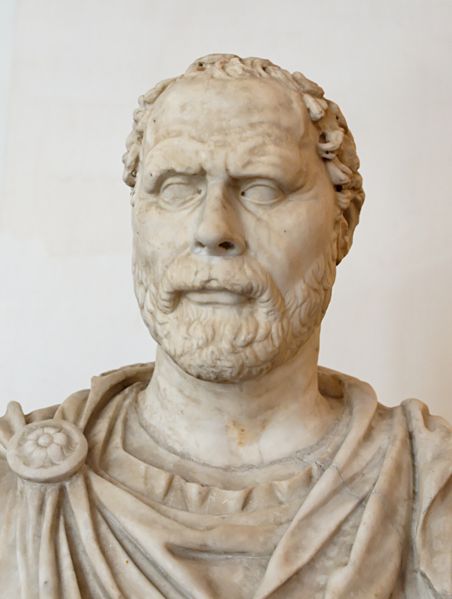
Demosthenes, master statesman and orator, loved his city-state of Athens. He cherished its way of life and abundant freedoms. And he believed in standing strong against anyone who might attempt to infringe on these privileges. This passion, unfortunately, was seldom shared by his fellow Athenians. While Philip the II of Macedon made bolder and bolder incursions into the Greek peninsula, the Athenian people seemed stuck in an apathetic stupor. For years, Demosthenes employed his powerful oratorical skills in attempts to awaken his fellow citizens from sleep to the realization of the imminent danger Philip posed. When Philip advanced on Thrace, the Athenians called an assembly to debate whether or not to finally heed the great orator’s advice. Demosthenes was sick of his brethren taking liberty and the Athenian way of life for granted and he boldly called upon them to rise up and take action. After his rousing speech, the assembly all cried out, “To arms! To arms!”
Worthy Excerpt:
It is this fate, I solemnly assure you, that I dread for you, when the time comes that you make your reckoning, and realize that there is no longer anything that can be done. May you never find yourselves, men of Athens, in such a position! Yet in any case, it were better to die ten thousand deaths, than to do anything out of servility towards Philip [or to sacrifice any of those who speak for your good]. A noble recompense did the people in Oreus receive, for entrusting themselves to Philip’s friends, and thrusting Euphraeus aside! And a noble recompense the democracy of Eretria, for driving away your envoys, and surrendering to Cleitarchus! They are slaves, scourged and butchered! A noble clemency did he show to the Olynthians, who elected Lasthenes to command the cavalry, and banished Apollonides! It is folly, and it is cowardice, to cherish hopes like these, to give way to evil counsels, to refuse to do anything that you should do, to listen to the advocates of the enemy’s cause, and to fancy that you dwell in so great a city that, whatever happens, you will not suffer any harm.
Read full text of speech here.
Chief Joseph, “Surrender Speech”
October 5, 1877; Montana Territory
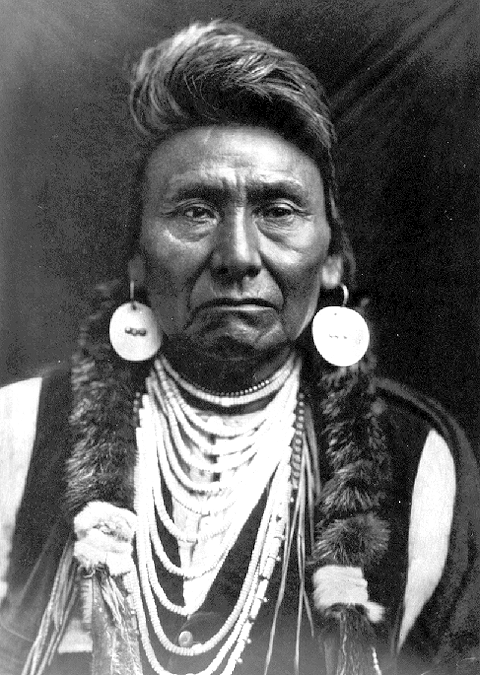
In 1877, the military announced that the Chief Joseph and his tribe of Nez Perce had to move onto a reservation in Idaho or face retribution. Desiring to avoid violence, Chief Joseph advocated peace and cooperation. But fellow tribesmen dissented and killed four white men. Knowing a swift backlash was coming, Joseph and his people began to make their way to Canada, hoping to find amnesty there. The tribe traveled 1700 miles, fighting the pursuing US army along the way. In dire conditions, and after a five day battle, Chief Joseph surrendered to General Nelson A. Miles on Oct. 5, 1877 in the Bear Paw Mountains of Montana Territory, a mere 40 miles from the Canadian border. The Chief knew he was the last of a dying breed, and the moment of surrender was heartbreaking.
The Speech
Tell General Howard I know his heart. What he told me before, I have it in my heart. I am tired of fighting. Our Chiefs are killed; Looking Glass is dead, Ta Hool Hool Shute is dead. The old men are all dead. It is the young men who say yes or no. He who led on the young men is dead. It is cold, and we have no blankets; the little children are freezing to death. My people, some of them, have run away to the hills, and have no blankets, no food. No one knows where they are - perhaps freezing to death. I want to have time to look for my children, and see how many of them I can find. Maybe I shall find them among the dead. Hear me, my Chiefs! I am tired; my heart is sick and sad. From where the sun now stands I will fight no more forever.
John F. Kennedy, “Inauguration Address”
January 20, 1961; Washington, D.C.
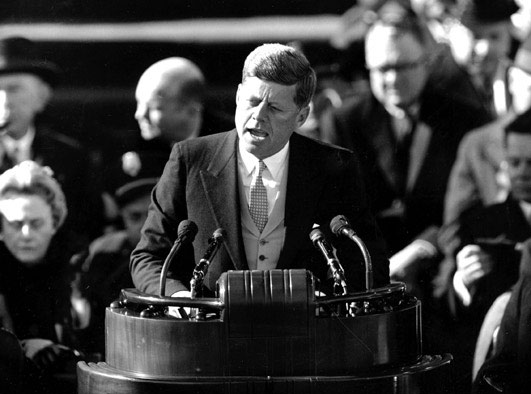
Young, handsome, with a glamorous family in tow, John F. Kennedy embodied the fresh optimism that had marked the post-war decade. On January 20, 1961, Kennedy took the oath of office as the 35th President of the United States. The youngest president in United States history, he was the first man born in the 20th century to hold that office. Listening to his inaugural address, the nation felt that a new era and a “new frontier” were being ushered in.
Worthy Excerpt:
Can we forge against these enemies a grand and global alliance, North and South, East and West, that can assure a more fruitful life for all mankind? Will you join in that historic effort?
In the long history of the world, only a few generations have been granted the role of defending freedom in its hour of maximum danger. I do not shrink from this responsibility — I welcome it. I do not believe that any of us would exchange places with any other people or any other generation. The energy, the faith, the devotion which we bring to this endeavor will light our country and all who serve it — and the glow from that fire can truly light the world.
And so, my fellow Americans: ask not what your country can do for you — ask what you can do for your country.
My fellow citizens of the world: ask not what America will do for you, but what together we can do for the freedom of man.
Read full text of speech here.
Ronald Reagan, “Address to the Nation on the Challenger”
January 28, 1986; Washington, D.C.
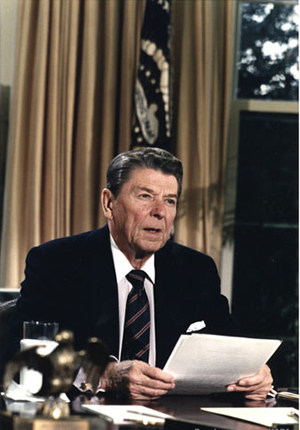
On January 28, 1986, millions of Americans, many of them schoolchildren watching from their classroom desks, tuned in to see 7 Americans, including Christa McAuliffe, a 37 year old schoolteacher and the first ever “civilian astronaut,” lift off in the space shuttle Challenger. Just 73 seconds later, the shuttle was consumed in a fireball. All seven aboard perished. These were the first deaths of American astronauts while in flight, and the nation was shocked and heartbroken by the tragedy. Just a few hours after the disaster, President Ronald Reagan took to the radio and airwaves, honoring these “pioneers” and offering comfort and assurance to a rattled people.
Worthy Excerpt:
We’ve grown used to wonders in this century. It’s hard to dazzle us. But for 25 years the United States space program has been doing just that. We’ve grown used to the idea of space, and perhaps we forget that we’ve only just begun. We’re still pioneers. They, the members of the Challenger crew, were pioneers.
And I want to say something to the school children of America who were watching the live coverage of the shuttle’s takeoff. I know it is hard to understand, but sometimes painful things like this happen. It’s all part of the process of exploration and discovery. It’s all part of taking a chance and expanding man’s horizons. The future doesn’t belong to the fainthearted; it belongs to the brave. The Challenger crew was pulling us into the future, and we’ll continue to follow them……
The crew of the space shuttle Challenger honoured us by the manner in which they lived their lives. We will never forget them, nor the last time we saw them, this morning, as they prepared for the journey and waved goodbye and ’slipped the surly bonds of earth’ to ‘touch the face of God.’
Read full text of speech here.
“Speech of Alexander the Great”
326 B.C.; Hydaspes River, India
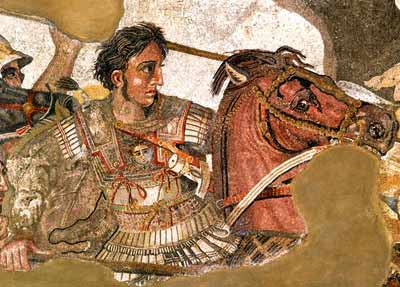
In 335 B.C., Alexander the Great began his campaign to recapture former Greek cities and to expand his empire. After ten years of undefeated battles, Alexander controlled an empire that included Greece, Egypt, and what had been the massive Persian Empire.
That wasn’t enough for Xander. He decided to continue his conquest into India. But after ten years of fighting and being away from home, his men lacked the will to take part in another battle, especially against an opponent like King Porus and his army. Alexander used the talent for oration he had developed while studying under Aristotle to infuse his men with the motivation they needed to continue on, to fight and to win.
Worthy Excerpt:
I could not have blamed you for being the first to lose heart if I, your commander, had not shared in your exhausting marches and your perilous campaigns; it would have been natural enough if you had done all the work merely for others to reap the reward. But it is not so. You and I, gentlemen, have shared the labour and shared the danger, and the rewards are for us all. The conquered territory belongs to you; from your ranks the governors of it are chosen; already the greater part of its treasure passes into your hands, and when all Asia is overrun, then indeed I will go further than the mere satisfaction of our ambitions: the utmost hopes of riches or power which each one of you cherishes will be far surpassed, and whoever wishes to return home will be allowed to go, either with me or without me. I will make those who stay the envy of those who return.
William Wilberforce, “Abolition Speech”
May 12, 1789; House of Commons, London
When William Wilberforce, a member of the British Parliament, converted to Christianity, he began to earnestly seek to reform the evils he found within himself and the world around him. One of the glaring moral issues of the day was slavery, and after reading up on the subject and meeting with anti-slavery activists, Wilberforce became convinced that God was calling him to be an abolitionist. Wilberforce decided to concentrate on ending the slave trade rather than slavery itself, reasoning that the abolition of one would logically lead to the demise of the other. On May 12, 1789, Wilberforce made his first speech on the abolition of the slave trade before the House of Commons. He passionately made his case for why the trade was reprehensible and needed to cease. Wilberforce introduced a bill to abolish the trade, but it failed, a result he would become quite familiar with in the ensuing years. Yet Wilberforce never gave up, reintroducing the bill year after year, and the Slave Trade Act was finally passed in 1807.
Worthy Excerpt:
When I consider the magnitude of the subject which I am to bring before the House-a subject, in which the interests, not of this country, nor of Europe alone, but of the whole world, and of posterity, are involved: and when I think, at the same time, on the weakness of the advocate who has undertaken this great cause-when these reflections press upon my mind, it is impossible for me not to feel both terrified and concerned at my own inadequacy to such a task. But when I reflect, however, on the encouragement which I have had, through the whole course of a long and laborious examination of this question, and how much candour I have experienced, and how conviction has increased within my own mind, in proportion as I have advanced in my labours;-when I reflect, especially, that however averse any gentleman may now be, yet we shall all be of one opinion in the end;-when I turn myself to these thoughts, I take courage-I determine to forget all my other fears, and I march forward with a firmer step in the full assurance that my cause will bear me out, and that I shall be able to justify upon the clearest principles, every resolution in my hand, the avowed end of which is, the total abolition of the slave trade.
Read full text of speech here.
Theodore Roosevelt, “The Man with the Muck-rake”
April 14, 1906; Washington, D.C.
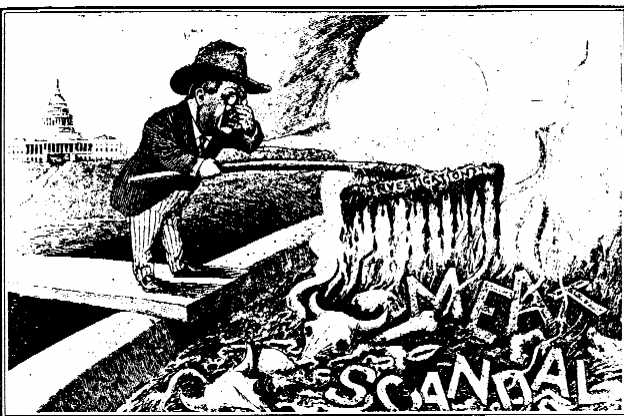
Theodore Roosevelt was president during the Progressive Era, a time of great enthusiasm for reform in government, the economy, and society. TR himself held many progressive ideals, but he also called for moderation, not extremism. The “Man with a Muck-rake” in Pilgrim’s Progress never looked heavenward but instead constantly raked the filth at his feet. TR thus dubbed the journalists and activists of the day who were intent on exposing the corruption in society as “muckrakers.” He felt that they did a tremendous amount of good, but needed to mitigate their constant pessimism and alarmist tone. He worried that the sensationalism with which these exposes were often presented would make citizens overly cynical and too prone to throw out the baby with the bathwater.
Worthy Excerpt:
To assail the great and admitted evils of our political and industrial life with such crude and sweeping generalizations as to include decent men in the general condemnation means the searing of the public conscience. There results a general attitude either of cynical belief in and indifference to public corruption or else of a distrustful inability to discriminate between the good and the bad. Either attitude is fraught with untold damage to the country as a whole. The fool who has not sense to discriminate between what is good and what is bad is well-nigh as dangerous as the man who does discriminate and yet chooses the bad. There is nothing more distressing to every good patriot, to every good American, than the hard, scoffing spirit which treats the allegation of dishonesty in a public man as a cause for laughter.
Such laughter is worse than the crackling of thorns under a pot, for it denotes not merely the vacant mind, but the heart in which high emotions have been choked before they could grow to fruition.
Read full text of speech here.
Franklin Delano Roosevelt, “First Inaugural Address”
March 4, 1933; Washington, D.C.
Franklin Delano Roosevelt handily beat incumbent Herbert Hoover in the 1932 presidential election. The country was deep into the Great Depression, and the public felt that Hoover did not fully sympathize with their plight and was not doing enough to alleviate it. No one was quite clear on what FDR’s plan was, but as in today’s election season, “change” was enough of an idea to power a campaign. In his First Inaugural Address, Roosevelt sought to buoy up the injured psyche of the American people and present his case for why he would need broad executive powers to tackle the Depression.
Worthy Excerpt:
I am certain that my fellow Americans expect that on my induction into the Presidency I will address them with a candor and a decision which the present situation of our Nation impels. This is preeminently the time to speak the truth, the whole truth, frankly and boldly. Nor need we shrink from honestly facing conditions in our country today. This great Nation will endure as it has endured, will revive and will prosper. So, first of all, let me assert my firm belief that the only thing we have to fear is fear itself-nameless, unreasoning, unjustified terror which paralyzes needed efforts to convert retreat into advance. In every dark hour of our national life a leadership of frankness and vigor has met with that understanding and support of the people themselves which is essential to victory. I am convinced that you will again give that support to leadership in these critical days.
Read the full text here.
Charles de Gaulle, “The Appeal of 18 June”
June 18, 1940; London
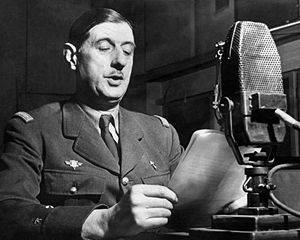
In June of 1940, it was clear that France was losing their country to the German invasion. Refusing to sign an armistice, Prime Minister Paul Reynaud was forced to resign. He was succeeded by Marshal Philippe Petain who made clear his intention to seek an accommodation with Germany. Disgusted with this decision, General Charles de Gaulle, leader of the Free French Forces, escaped to England on June 15. De Gaulle asked for, and obtained permission from Winston Churchill to make a speech on BBC radio. De Gaulle exhorted the French to not give up hope and to continue the fight against the German occupation and the Vichy Regime.
Worthy Excerpt:
But has the last word been said? Must hope disappear? Is defeat final? No!
Believe me, I who am speaking to you with full knowledge of the facts, and who tell you that nothing is lost for France. The same means that overcame us can bring us victory one day. For France is not alone! She is not alone! She is not alone! She has a vast Empire behind her. She can align with the British Empire that holds the sea and continues the fight. She can, like England, use without limit the immense industry of the United States.
This war is not limited to the unfortunate territory of our country. This war is not over as a result of the Battle of France. This war is a worldwide war. All the mistakes, all the delays, all the suffering, do not alter the fact that there are, in the world, all the means necessary to crush our enemies one day. Vanquished today by mechanical force, in the future we will be able to overcome by a superior mechanical force. The fate of the world depends on it.
Read full text of speech here.
Download Your Free Guide to Being a Gentleman in 2008.

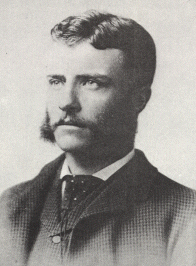
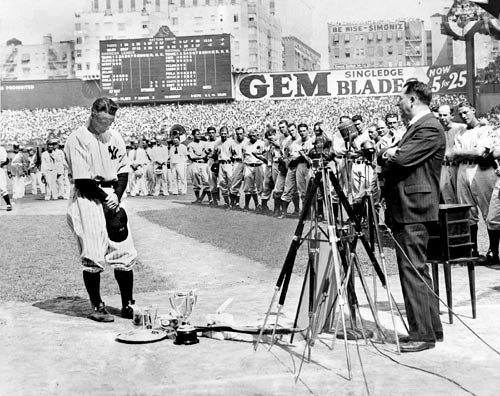
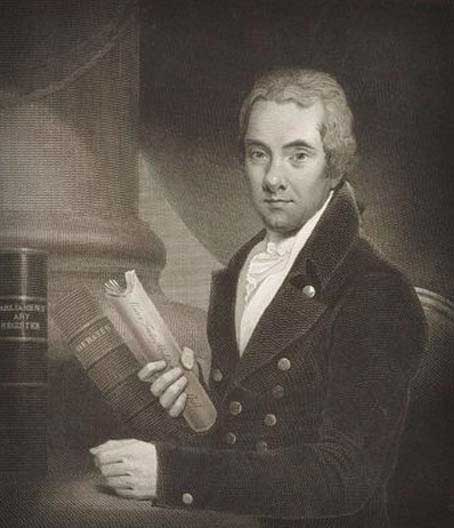
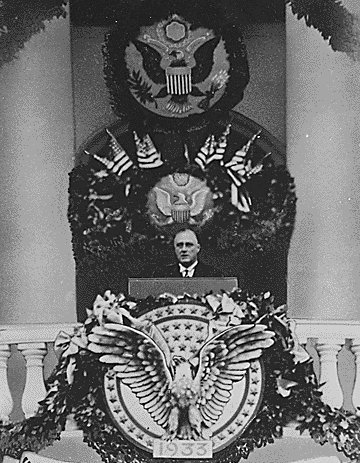
No comments:
Post a Comment